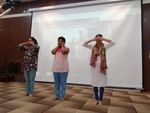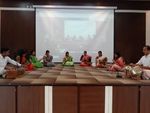Remembering the Great Sons of India: Celebrating Gandhi Jayanti - S.B. Patil Public School
←
→
Page content transcription
If your browser does not render page correctly, please read the page content below
____________________________________________
Remembering the Great Sons of India:
Celebrating Gandhi Jayanti
Pune, Maharashtra| October 2nd, 2020
by Ishika Wagh | VII-A
Additional Content by Ms. Swaleha Mujawar | CCA In-charge
Gandhi Jayanti is celebrated on the second of October, the birth
anniversary of Mahatma Gandhi. It is celebrated to honour and
remember this great leader and his struggle for the freedom of India
against the British Raaj.
Mahatma Gandhi was a great hero. He sacrificed his life to uplift the
status of people, and battle for the freedom of his country. He was a
symbol of love and compassion. This great leader was born on
nd
October 2 , 1869 in Porbandar, Gujrat to Karamchand Gandhi and Putlibai.
In the year 1888, he travelled to England to pursue his studies, and returned to India after becoming
a barrister in 1891. Mohandas Gandhi left his job as a lawyer since it was impossible for him to
undertake the fake cases in court, and thus began actively taking part in India’s freedom movements.
Rabindranath Tagore bestowed upon him the title of “Mahatma”; ergo, Mohandas become
Mahatma Gandhi.
Gandhiji launched many movements such as Satyagraha, the Dandi March, the Salt Act, the Civil
Disobedience Movement and many such more. It is due to the continuous effort of Gandhiji and his
followers that India finally attained freedom on August 15th, 1947.
Unfortunately, this great leader left for his heavenly abode on January 30th, 1948. Even today, the
entire nation salutes this great leader, who aided India to achieve her freedom from 200 years of
domination and persecution through non-violence.
He was a true follower of truth and non-violence. Gandhiji
illustrates these traits through the symbolism of the three
monkeys:
The three wise monkeys are a Japanese pictorial maxim,
embodying the proverbial principle “See No Evil. Hear No Evil.
Speak No Evil”. The three monkeys are: Mizaru, who sees no evil,
hence covering his eyes; Kikazaru, who hears no evil, hence
covering his ears; and Iwazaru, who speaks no evil, hence covering his mouth.Summing up his beliefs, one of the most famous quotes spoken by the Mahatma is: “Silence is the best
answer to non-violence and anger.”
Thus on the occasion of October 2nd, 2020, S.B. Patil Public School held a special assembly to
commemorate the birth anniversary of the Father of our Nation. The day is also the birth
anniversary of the second Prime Minister of India, Lal Bahadur Shastri.
The programme commenced with the principal, Dr. Bindu Saini;
and the coordinator, Ms. Padmavati Banda paying homage to these
two great people. They garlanded the photographs of the Mahatma
and Lal Bahadur Shastri. The school’s Office Superintendent, Mr.
Nilesh; pre-primary coordinator, Ms. Shubhangi Kulkarni;
secondary sub-coordinator, Ms. Nirupama Kale; and primary sub-
coordinators, Ms. Vandana Sangle and Ms. Archana Prabhune also
paid their respects.
Guided by the school’s music teachers, Ms. Sulochana Pawar, Mr. Kuldeep Ghadge and Mr.
Prathamesh Inamdar, the music team comprising of faculty members from the primary and
secondary sections presented the well-known devotional song, “Raghupati Raghav Raja Ram”.
Following this, faculty members from both the primary and
secondary sections presented a skit which highlighted the four
golden moral rules of the Mahatma: prayer, cleanliness, satyagraha
and the symbolic significance of the three monkeys: “Speak No Evil,
Hear No Evil, and See No Evil.”
Another devotional song, “Hum Laaye Hain Toofan Se Kashti Nikaal
Ke” following suit marked the value to be attributed to the freedom
by the forthcoming generations.
Post this, the students from grades V to IX of S.B. Patil presented,
via Google Meet, their speeches, self-composed poems, patriotic
songs, mono-acts, skits, PPTs on “The ideals set by the great sons of
India and their relevance in the modern times for India and the world”, and
panel discussions on the Gandhian principles and their relation to the ongoing worldwide COVID-
19 pandemic.
2The participants had been practicing their performances for days, and had been guided by the CCA
in-charge, Ms. Swaleha Mujawar; the Sanskrit Language teacher, Ms. Deepika Kannao; and the
music teacher, Mr. Prathamesh Inamdar.
Following is the list of all the participating students:
The Gandhi Jayanti Programme Participants
S. No. Participant Class Presentation
1. Eshita Patil V-F A speech on Mahatma Gandhi
2. Sameera Kulkarni VIII-A Song: "De di Hume Azaadi "
3. Anushka, Savari VI-A A skit on a life incident from the childhood life of Gandhiji
4. Sahil Wagh VI-E A mono act on Champaran (An incident from the life of Gandhiji)
PPT Presentation on the Gandhian Principles and the student
5. Shreya Gugaliya VI-A
community
6. Anu Anil VI-E The influence of Gandhiji as a world leader
7. Avani Khandelwal VIII-B Speech on Lal Bahadur Shastri
8. Mahika Rege VI-A A self-composed poem on Mr. Shastri
9. Gaurangi Sharma VI-F Ideals of Mr. Shastri applicable in today's India
10. Keshav Bharadwaj VI-F Song: "Jai Jawaan Jai Kisan"
11. Soha Shaikh IX-C An extract read from the biography of Lal Bahadur Shastri
Atharva, Asmita,
Aarohi, Shravani,
12. VII-B A discussion on Gandhiji, Swachh Bharat and Corona
Devanshu, Sunidhi,
Hridaya, Rudransh.
13. Samruddhi Borate IX-C A Hindi poem on the Mahatma and Lal Bahadur Shastri
The event, in toto, which was also live telecast on the school’s Facebook page, was appreciated and
lauded by all faculty present in person, and the students, parents and management, who were part of
virtual audience. The paramount success of the day was owing to the mentorship of the principal,
Dr. Saini; the school coordinator, Ms. Padmavati Banda; as well as all the section coordinators and
sub-coordinators who has worked tirelessly to ensure the fruitful execution of the programme.
The creative initiative and determined efforts of the members of the school’s Co-curricular Activities
Department and the Music Department also were equally worthy of gratitude and praise.
3You can also read






















































